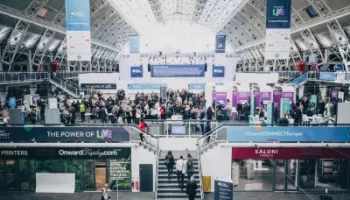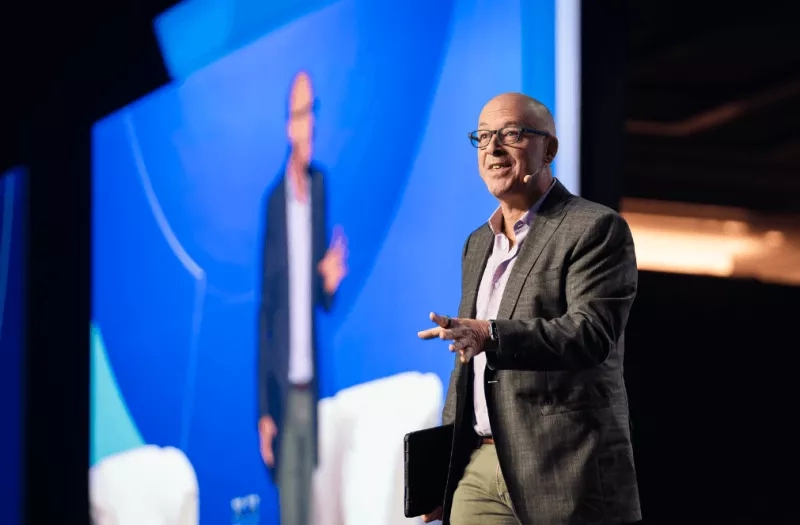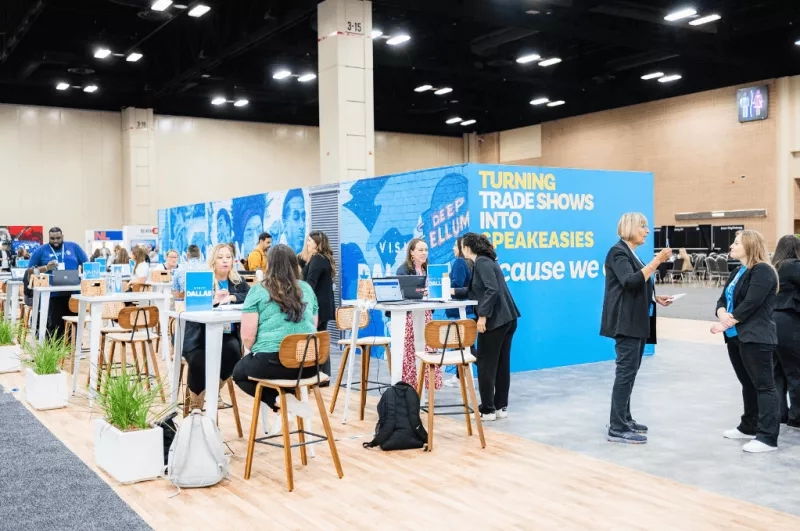
Your pre-event work is done, and you're ready to share your event with your target audience. You've put in all the work to plan the event, and your team has poured their hearts and souls into it. Now it's time to get the word out, hit those registration goals, and fill those seats. You send out emails, share on social media, and post a landing page on your website, hoping people will sign up. But is that enough? Depending on your organization and audience, sometimes it is. But other times, for various reasons, it may not be enough.
A best practice is to make a real impact with your event communication strategy—one that grabs attention and reaches the right people at the right time. So, how do you do that? Let's find out—and more.
Understanding Event Announcements
An event announcement is a publicly shared list of all the details about an upcoming event. It builds hype and interest among potential attendees. These announcements can be for in-person, hybrid, or virtual events.
You can announce your event in many ways. For example, email to your subscriber list, write a press release for events, social media, video across your online platforms, radio ad, brochure or signage, or a new landing page.
If you use an event marketing platform, your CTA could be "register now." If tickets or registration are unavailable, your CTA could be "Stay tuned on social media for more info."
Why Does an Event Announcement Matter?
An event announcement is your first chance to make a big impact and get people excited about what's coming. It's not just about sharing the details; it's about grabbing attention and building anticipation and interest before the event date.
A good announcement puts your event on the map, helps you stand out in a crowded market, creates buzz, gets people talking, and ensures your audience knows why they can't miss it. Plus, it encourages early planning and sets the tone for the kind of experience you're offering—an exclusive webinar, a vibrant festival, or anything in between.
Ultimately, an event announcement increases your reach and engagement and sets you up for success. It's your chance to make a great first impression and ensure your event is something people will put in their diaries and look forward to.
How Do You Write an Event Announcement?
An event announcement that grabs attention and drives interest requires you to create a message that resonates with your audience, gets them excited, and gets them to act. Here's how to write an event announcement that stands out:
Start with a Headline: Your headline is the first thing people will see, so make it look good. Use strong language that gets the point across. Whether it's a "Can't-Miss Summer Music Fest" or an "Innovative Tech Conference," your headline should get attention and create curiosity.
Showcase the Essentials: List the basic info your audience needs to know:
- Event name
- Date and time
- Location
- Speakers, performers, or attractions and activities
- Type of event (workshop, festival, webinar, etc.)
- Contact info (email, website, phone number)
Explain What's Special About Your Event: Announcing event speakers, one-of-a-kind experiences, or special performances can potentially help you make your event unique and tell people why they should attend. Always use descriptive language so attendees get a taste of what to expect.
Add a Clear CTA: Tell your audience what to do next, whether it's "Buy Tickets Now," "Register Today," or "Save the Date." Include links, buttons, or contact info to make the CTA stand out and easy for people to act on.
Make It Visual: Use eye-catching images, graphics, or videos to make your announcement more interesting. Visuals grab attention and give people a sense of what your event is like so they can imagine themselves there.
Share Across Multiple Platforms: Share your event announcement via email, social media, your website, and even offline, like flyers or posters. Tailor your message for each platform to get the most impact.
Create a Sense of Scarcity: Add scarcity to encourage people to act fast by adding scarcity. Phrases like "Limited Seats Available," "Early Bird Discounts End Soon," or "Don't Miss Out." usually create a sense of FOMO (Fear of Missing Out) and get people to act immediately.
Personalize Where You Can: If you're sending via email or social media, personalize it to make it feel more direct. Use the recipient's name, reference their past attendance, or highlight event elements that will appeal to them.
Check and Test: Before you send or publish, double-check for errors, clarity, and readability. Test links and CTAs and review the content so it's on brand and on message. And don't forget to share the meeting link if you're hosting virtual or hybrid events.
How to Promote an Event
Here are the best event promotion ideas that not only get the word out and get people excited.
Event Announcement Emails
Emails give you direct access to a list of people who have already expressed interest in your events. It's a platform with leads that are more likely to engage.
To get through the noise, consider using email marketing tools, which offer simple, affordable templates to create professional-looking announcements quickly. The average open rate across all industries is 21.33%, making event email marketing a strong channel to get the necessary attention.
But how do you get your email opened and read?
- Event Subject Line: Keep it short and personal, and use strong verbs or active language. Depending on your audience, an emoji might help grab their attention.
- Content: Once you have their attention, ensure your email content is clear, relevant, and compelling. Include all the details, highlight what's special about your event, and why they can't miss it.
- CTA: Your CTA should show recipients what to do next, like "Buy Tickets Now" or "Register Today."
Pro Tip: Send your email announcements on Tuesday or Wednesday for the best engagement. These days, they tend to have higher open rates. For more details, see our event marketing guide.
Social Media Event Announcements
Social media gives you a wider reach as your followers can share your event announcement with their networks and increase visibility and engagement. Plus, social media is a cost-effective way to build brand awareness.
Choose the platform that fits your audience and the type of content you want to share. Use visually-driven platforms like Instagram, video-based channels like TikTok, text-focused spaces like LinkedIn, or all-rounders like Facebook and X (formerly Twitter).
To create social media content, start with a strong visual to grab attention—you have just a few seconds to get someone's attention. Use branded graphics, videos, or images from past events to create FOMO. Next, keep the text short, include a clear CTA, and link to your event page.
Pro Tip: Try A/B testing with different announcements to see which gets the most clicks.
Video Announcements
Video is the best way to announce your event. A good video can stop people from scrolling and is easy to share across multiple platforms. Keep your video announcement short and sweet, and include all the event details to make it stand out.
Go for an authentic style with unpolished, mobile-shot footage that feels more "human" and relatable. Show behind-the-scenes moments and highlights from previous events or speak directly to the camera to invite people personally.
YouTube is good for longer videos, and Instagram Reels, TikTok, and Snapchat are good for shorter clips. You could also livestream your announcement on Twitch or Snapchat to add some dynamism.
Pro Tip: Repurpose your video content across multiple platforms. Post the full version on YouTube or Facebook and create shorter versions for Instagram and TikTok. Embed the video on your event page so visitors can get a sneak peek of what to expect.
The Best Time to Announce Events
The timing of your announcement can make all the difference to your event's success. Here's what to consider:
Consider Your Event Date
A good rule of thumb is to announce your event 6-8 weeks in advance. This gives your audience enough time to plan and book in their calendars, but not so far in advance that it loses its excitement. If it's a bigger or more exclusive event like a conference or festival, consider announcing it even earlier – 3-6 months in advance – so people can plan and market more extensively.
Target Key Days of the Week
Some days are better than others for event announcements. Tuesdays, Wednesdays, and Thursdays are generally the best days to announce events. People are less distracted on these days than on Mondays (which can be chaotic) and Fridays (when people are mentally winding down for the weekend).
Time of Day Matters
The time of day also matters. Send out your announcements mid-morning 9–11 AM) or early afternoon 1–3 PM). This is when most people check their emails or scroll through social media but aren't yet overwhelmed by their daily tasks or winding down their day.
Match Your Audience's Schedule
Always consider your target audience and their schedules. If your event is for professionals, announcing during the workweek makes sense. But if your audience is families or students, you might get better results by announcing in the evenings or weekends, when they are more likely to be online and engaged.
Seasonal Trends
Consider the time of year and any holidays or big events impacting your audience. Announcing in January or September works well as people set new goals or look for activities after the holiday season or summer break. Don't announce during major holidays when people will be less likely to engage with your content.
Create Urgency with Timed Announcements
Use timed announcements to create urgency. Send event reminder emails with subject lines like "limited-time early bird discount" or a "24-hour flash sale" to get quicker responses and more registrations.
Also, read the following types of emails to send before your event.
Event Announcement Templates
Here are some event invitation templates and subject lines to help you announce your event. Copy and paste them, or use them as inspiration to create your own!
Announcing a Conference
Subject Line: Get the Inside Scoop: Join Our [Industry Name] Event
Body:
Hi [Recipient Name],
I hope you're doing well. We're thrilled to invite you to our [date] [location] event. You've been doing great things in the [industry name], and we'd love to have you join us.
Here's a preview:
Panel Sessions: Listen to industry thought leaders discuss the latest [industry name] trends.
Hands-on Workshops: Get practical skills to take away.
Networking: Meet other [industry name] professionals.
Register by [time and date] to secure your spot. We really hope you can join us.
Cheers,
[Your Name]
Host a Conference
Subject Line: Come Along for the Ride: Invitation to Our Annual Event.
Body:
Hi [Recipient's Name],
I hope you're doing well. We're excited to invite you to our annual event, which is all about knowledge, collaboration, and inspiration.
Date: [Conference Date]
Location: [Conference Venue]
Join us for a day off:
- Keynote Speakers: Listen to stories and learnings from the visionaries.
- Workshops: Get practical knowledge and skills.
- Networking: Meet and connect with others and build relationships.
Register now.
Looking forward to seeing you.
Best,
[Your Full Name]
Trade Show
Subject: Unveiling Innovation: Trade Show
Body:
Hi [Recipient's Name],
We're proud to announce our Trade Show, where we'll be unveiling the latest [industry/niche] innovations.
Event Details:
[Trade Show Date]
[Trade Show Venue]
Why attend?
- Exhibits
- Panel discussions
- Networking
Register now at [Trade Show Website].
See you there.
Best,
[Your Full Name]
RSVP for Corporate Getaway
Subject: Your presence requested: RSVP for Executive Retreat
Body:
Hi [Recipient's Name],
We'd like you to join us for our Executive Retreat, a time for reflection, collaboration, and relaxation.
Event Details:
[Retreat Dates]
[Retreat Venue]
Strategic discussions, networking, and personal growth workshops. RSVP by [RSVP Deadline] at [RSVP Link] to book.
See you there.
Warm regards,
[Your Full Name]
Announce Events With Confidence
Remember, announcing your event is all about timing, creativity, and choosing the right channels to talk to your people.
Whether you're writing an email, creating social media content, or producing a video, a good announcement sets the stage for a great event. Use the templates and tips we've shared to get people excited and make your next event a sell-out.
Up next, please read our guide on creating perfect event proposal templates.












